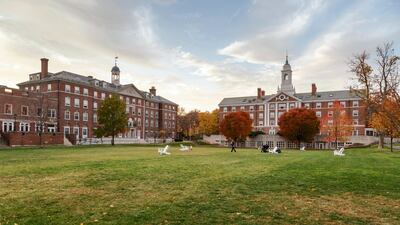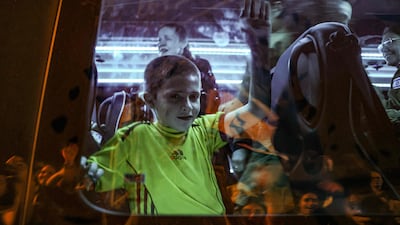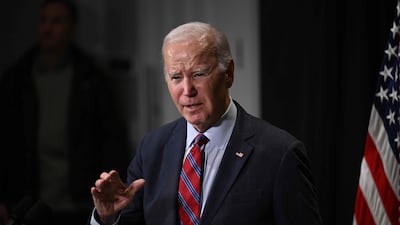Live updates: Follow the latest news on Israel-Gaza
Anti-Semitism has “no place” on campus, the presidents of some of the top US universities told Congress on Tuesday, warning of a surge in anti-Semitic, Islamophobic and anti-Palestinian hate.
The presidents of Harvard University, Massachusetts Institute of Technology and University of Pennsylvania were called to defend their institutions at a Republican-led House Education Committee hearing “to answer for mishandling of anti-Semitic, violent protests”.
Claudine Gay, president of Harvard, said “anti-Semitism is hate, or suspicion, of Jewish people – and that's all I need to know to take action against it on campus”.
“I have seen reckless and thoughtless rhetoric here in person and online on campus and I've listened to leaders in our Jewish community who are scared,” said Ms Gay, who defended universities for walking a tough line between combating hate and defending campus free speech.
UPenn president Liz Magill, one of the seven universities involved in a federal civil rights investigation over claims of anti-Semitism on campus, emphasised that “history teaches us that where anti Semitism goes unchecked, other forms of hate spread and ultimately can threaten democracy”.
“At Penn, we are investigating all these allegations from members of our community and providing resources for individuals experiencing threats online harassment,” she said.
“We will continue to deploy all the necessary resources to support any member of the community experiencing hate.”
The university leaders noted that hate has expanded beyond the committee's focus on anti-Semitism to include “anti-Muslim, anti-Palestinian” hate as well.
The hearing came amid a surge in anti-Semitic and Islamophobic hate crimes in the US, including the killing of six-year-old Palestinian-American Wadea Al Fayoume.
Republicans largely centred their questioning on a surge in college activism amid the Israel-Gaza, showing video footage of pro-Palestine demonstrators at colleges and universities chanting “free Palestine” and “intifada”. Committee chairwoman Virginia Foxx asked each witness to state if they agreed that “Israel has the right to exist”.
Equating demonstrations against the Israeli government's actions in Gaza to anti-Semitism has drawn criticism from some corners of staunchly pro-Israel Washington.
Jerry Nadler, a Jewish-American congressman from New York, this week spoke out against a new resolution in the House that states that “anti-Zionism is anti-Semitism”.
“That's either intellectually disingenuous or just factually wrong … The authors if they were at all familiar with Jewish history and culture, should know about Jewish anti-Zionism that was and is expressly not anti-Semitic,” Mr Nadler said on Monday.
Educational issues have been at the centre of the conservative-led “culture wars” in the US and Republicans focused much of their criticism of the witnesses on claims of a lack of “ideological diversity”.
Glenn Grothman grilled Ms Gay over “only 2 per cent” of Harvard's faculty having a favourable view of right-wing former president Donald Trump.
Joe Wilson, who also serves as chairman of the Middle East House Foreign Affairs subcommittee, charged that universities have become “illiberal sewers of incompetence and bigotry”.
Ranking member Bobby Scott charged Republicans with hypocrisy over their more tempered response when Mr Trump said there were “good people on both sides” of a deadly 2017 Unite the Right rally in Charlottesville, Virginia, during which white supremacist factions chanted slogans including “Jews will not replace us”.
“You can't have it both ways,” Mr Scott told Republican members.
A 2022 poll from J Street, a non-profit organisation that focuses on Jewish-American voters and is a self-branded “pro-Israel, pro-peace” organisation, found that 97 per cent of Jewish people in the US are concerned about the rise of anti-Semitism.
Pew Research in 2021 found that “many Americans know little about Islam or Muslims, and views towards Muslims have become increasingly polarised along political lines”.
Pro-Palestine and Pro-Israel supporters protest in New York – in pictures
And in 2017, during the first few months right-wing former president Donald Trump's administration, Pew found that 48 per cent of Muslim-American adults “had personally experienced some form of discrimination because of their religion in the previous year”.
Growth of US pro-Palestine demonstrations
According to the Crowd Counting Consortium, a group run by researchers from Harvard and the University of Connecticut, this year's pro-Palestine wave is the largest and broadest in US history since the social justice uprisings of 2020.
“One reason this year's pro-Palestine wave has got so large is that it spread to so many towns including ones that haven't traditionally mobilised around this issue,” said Jay Ulfelder, a Harvard political scientist who led the research.
“This isn't just a big city thing and the movement still spreading to new parts of the country.”
The consortium, which has been monitoring protests in the US since the 2017 Women's March, has documented more than 2,100 pro-Palestine demonstrations in 497 cities and towns across 49 states since October 7.
Their data revealed contrasts between the pro-Palestine and pro-Israel rallies.
“We've seen elected officials at a much larger share of the pro-Israel events than the pro-Palestine ones – almost 25 per cent compared with less than 2 per cent at the pro-Palestine events,” explained Mr Ulfelder.
Furthermore, he noted, among the officials seen at pro-Israel events, there have been a substantial number of state governors and US senators, whereas the highest-ranking officials spotted at pro-Palestine events have been US representatives.
The Crowd Counting Consortium said there has also been a shift in rhetoric. They analysed language used at pro-Palestinian gatherings and observed shifts in messaging in the weeks following October 7.
In the initial stages, references to “apartheid” and “rights and resistance” gradually shifted to “stop funding genocide”, “stop killing children” and calls for “ceasefire now”.
“Ceasefire now” is the third-most used slogan at pro-Palestinian gatherings, not far behind “from the river to the sea”, according to the study. The latter reference – “from the river to the sea, Palestine will be free” – is considered anti-Semitic by critics, while those who support it consider it a call to freedom.




























